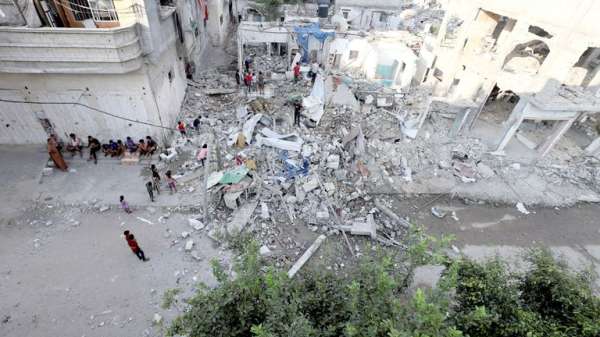
There’s been a furious flurry of diplomatic activity in the Lebanese capital Beirut ahead of crucial talks in Doha aimed at reaching a ceasefire deal in Gaza.
The US special presidential envoy Amos Hochstein flew into Lebanon to try to avert a regional war, warning the escalating tension risks spiralling “out of control”.
Iran and Lebanon’s Hezbollah are both vowing to take retaliatory action for twin attacks in Tehran and Beirut, which they blame on Israel.
Israel has admitted it carried out the Beirut attack which killed a key Hezbollah commander, but has neither confirmed nor denied the assassination of the main Hamas negotiator Ismail Haniyeh whilst he was visiting Iran.
“There is no more time to waste… and there’s no more valid excuses from any party for any further delay,” Mr Hochstein said, with more than a hint of frustration about reaching a deal which would see the fighting halt, the Israeli hostages held in Gaza freed and Palestinian prisoners released.


A diplomatic solution is possible, Mr Hochstein said, but he attempted to try to persuade the parties that the deepening hostilities on the Lebanon-Israel border should be detached from the Israeli-Hamas negotiations.
That seems unlikely given that Lebanon’s Hezbollah group insists it began firing into Israel on 8 October to support the Palestinian cause and will only stop once there’s a ceasefire agreed by Hamas.
Dr Ahmed Abul Hadi, the Hamas representative in Lebanon, has told Sky News that they will not be joining the talks despite being “interested in an agreement”.
He went on to say: “[Israeli Prime Minister Benjamin] Netanyahu and his Government are still setting new conditions. Netanyahu is not interested in reaching an agreement.”

Israeli Government spokesman David Mencer denied this. “It is Hamas that continues to set additional terms and has refused to reach an agreement,” he said.
But in a series of meetings around the capital, the US envoy heard how senior politicians simply do not believe the Israeli assertions.
Because the US, UK, and other countries have designated Hezbollah a terror outfit, Mr Hockstein met intermediaries who can pass on messages to the Iran-aligned group.

Follow Sky News on WhatsApp
Keep up with all the latest news from the UK and around the world by following Sky News
Tap here
One of his first meetings was with Nabih Berri, the Lebanese Parliamentary speaker who has often acted as an interlocutor between Western Governments and Hezbollah.
But the statement he released to reporters later appeared to indicate that the meeting had been less than perfect.
“The policy of cross-border assassinations and daily massacres in Gaza and Lebanon demonstrate Israel’s determination to continue military escalation and thwart any effort to stop the war,” Mr Berri said.
He expressed to the US envoy his “deep concern” about what he described as the “escalatory steps” taken by Israel at political and military levels, “whether it be in Tehran or Beirut, not to mention the daily Israeli massacres committed against children and civilians in the Gaza Strip and Lebanon”.

Even as the shuttle diplomacy was ongoing, the Israeli strikes were continuing in Gaza amid the countdown to the ceasefire talks.
“These are children,” shouted one crying man as he helped carry a small bundle out of the back of a vehicle and into a crowded makeshift emergency room.
Inside, amidst the chaos of injuries and grief, one badly wounded child lay heavily bandaged next to a lifeless toddler.
An adult was slowly tying her hands together to prepare her for wrapping in a body bag. Another bloodied girl sat alone nearby; arms outstretched to the standing adults around her.
This is the ever-continuing backdrop to the negotiations in Doha. Killing, death, despair and desperation.
It’s been going on for ten months now. And amidst this ongoing Israeli bombing and fighting, there are more than 111 hostages held somewhere in Gaza.

The British, American and German ambassadors in Israel, made a joint call for their release ahead of the Doha talks.
“There can be no further delay… now is the time for a deal that sees the immediate return of the hostages and a ceasefire in Gaza,” said the UK’s Simon Walters.
Right now, the hopes for any deal seem slim – but there are hopes and the US envoy insists it is critical to take advantage of this “window for diplomatic action”.

